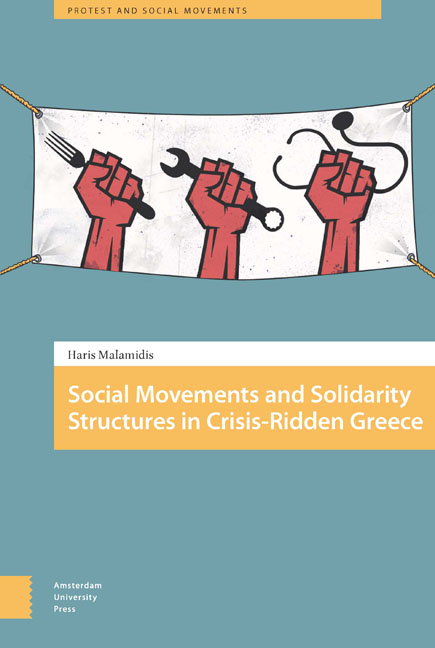Book contents
Summary
Abstract
This chapter provides the conclusion of the book. It starts by providing an overview of the analysis discussed in the different chapters. Subsequently, the epilogue sets the basis for a discussion regarding the rise of the alternative repertoires and the way they touch upon issues that move beyond the narrow interest of the Greek context. Therefore, it relates the shift from protest-oriented and claim-based actions towards the provision of bottom-up welfare services within the neoliberal political economy. Moreover, it associates the pre-figurative politics of everyday life with solidarity economy, the commons, and the role of the local contexts. Finally, it discusses the relation of alternative repertoires with debates on citizenship and provides some recommendations for future research.
Keywords: Boundary enlargement; Political economy; Pre-figurative politics; Social solidarity economy; Commons
In response to the 2008 economic crisis, the European states implemented a series of strict austerity measures, the most severe of which were implemented in the Mediterranean countries. Austerity agendas were met with tremendous social mobilizations, triggering a new cycle of contention. The exposition of the Greek national debt placed the country at the epicentre of the economic crisis. Similar to the policies of the neoliberal “shock doctrine” (Klein, 2007), Greek authorities signed a series of structural adjustment programmes known as Memorandums of Understanding, with the International Monetary Fund (IMF), European Commission (EC), and European Central Bank (ECB), severely affecting the livelihood of millions of citizens. Despite the desire of neoliberal economists to distinguish the economic realm from the rest of the social spheres, changes in the economic conditions largely affected the Greek political life. The implementation of consecutive electoral rounds, the degradation of mainstream political parties accompanied by the rise of less popular and newly emerging parties, the formation of governmental coalitions in a country with a strong tradition in one-party-governments, as well as the rise of abstention votes, outline several of the major features that led to broader political instability.
The crisis and its effects also touched the unofficial political terrain of social movements. The harsh economic conditions and the inability of private and public institutions to provide welfare services to large parts of the population, brought the exercise of service-oriented practices by social movement actors to the forefront.
- Type
- Chapter
- Information
- Publisher: Amsterdam University PressPrint publication year: 2020



